Nathan Freitas holding a Peek with Oliver+Coady partner David Oliver talking to fans at New York Tech Meetup – Mobile Meets Social
Volunteerism and participation in public life seem to come naturally to Nathan Freitas. Nathan is one of the leading innovators/developers in NYC in mobile strategy/design (for more on his Android development read on). And he is much in demand as speaker who shows others how to realize their mobile experience and design dreams (for upcoming speaking engagements see Nathan’s blog). But also Nathan has spent much of the last ten years working on new ways for causes and non profits to benefit from technology.
Most recently Nathan has started working part time for the NY Senate under, “Albany’s King Geek,” the new CIO Andrew Hoppin:
“The CIO team is organizing training sessions for senators and their staff on social networking platforms and how to pay attention to online feedback. Last week, they hired mobile specialist Nathan Freitas to create new phone applications that will allow citizens to get government news on the go.”
Also, Nathan is currently supporting engineer on, The Extraordinaries, a smart phone application that explores territory “beyond the flattening tendency of online relationships” (see this list from Andy Oram of the Questions on Government participation). The Extraordinaries is Ben Rigby and Jacob Colker’s prize winning project – “a smartphone application that delivers volunteer opportunities on-demand.”
Ben’s post, Information Age Volunteerism – Open Sourced! Crowdsourced! and the extensive comments give a detailed analysis and critique of this brilliant and creative new approach to volunteersim in the information age.
Nathan, in my view, is a great example of how to “do well by doing good.” And, I am particularly excited by the work Nathan and his partner in Oliver+Coady, David Oliver, are doing on Android, e.g., Nathan’s new gReporter – opensource, geotagging, media capture report client (you can download the source here).
I first met Nathan when I interviewed him about Cruxy in 2007 (see my post, The Mixed Reality Metarati and “Destroy TV:” Merging Art, Technology, Politics and Play). Nathan recently announced that “the fat lady has just uploaded her last song.” Cruxy was an innovative distributed music venture Nathan started with Jon Oakes. Although, as Nathan explains, Cruxy “never really broke through in the way we hoped.” Nevertheless Cruxy seems to have been a fertile garden for ideas that are coming of age in Oliver-Coady’s current mobile experience endeavors. As Nathan explains, “the world, including Apple and iTunes, has shifted to embrace some of the ideals we have always had – open formats, more ways to distribute and promote online, more avenues for niche content to be discovered and heard.” Cruxy’s technology platform, built by the incomparable Will Meyer:
“was a great success in my mind, being one of the first to fully embrace Amazon’s cloud and provide a widget-based commerce system that actually worked!”
Nathan has a new company, Oliver+Coady. But Nathan told me that he feels he is over his “start up phase.”
Nathan Freitas: I am just tired of the term “startup.” I’m more interested in being defined as person than a member of a corporation. Also I am more interested in the ideas of cooperatives, and have been working on this idea (see here for more on the New York Creative Cooperative ).
Tish Shute: You do a high percentage of non profit work. Are you still managing to keep the home fires burning in the economic downturn?
Nathan Freitas: There is definitely profit to be made in non-profits because even if you only get paid half of what you get for corporate work, it is worth it in terms of fulfillment, ego, respect, and general contribution back to the planet. However, I’ve also been investing time & energy w/o pay into thinking about how causes can benefit from technology for over ten years. So its not just something you decide to do one day, and suddenly are successful.
Tish Shute: What are some of the highlights of your non profit work recently?
Nathan: Well, The Extraordinaries project is definitely a highlight. It is focused on a whole new approach to volunteering and winning the first prize at the WeMedia Conference for the non-profit tech category was a great validation of the work. I am just a supporting engineer on the effort, which was founded by my good friend Ben Rigby (a longtime non-profit tech guy as well) and Jacob Colker.
Ben wrote this excellent book on mobile tech and organizing, Mobilizing Generation 2.0 He’s done a ton of mobile work with youth voters via his non-profit, Mobile Voter.
The Extraordinaries is really taking all of our joint experience and putting it into a whole new system that is meant to go beyond generic email blasts that just ask you to “send a fax” or “send a link”. it gives people specific tasks they can accomplish on their phone or in their local area using their phone.
Tish: Did you do Twitter Vote Report with Ben too?
Nathan: Oh, no, Twitter Vote Report was with a different group of folks…mostly east coast-based, organized by the TechPresident.com blog. But Ben and I worked on SMS efforts for the 2004 election. We sent 40,000 messages out to SEIU labor members and MoveOn members… really the first time SMS was used in a wide-scale manner to help get out the vote on election day.
Tish: Do you have a new mobilization project planned?
Nathan: Its all about The Extraordinaries right now. We’ve got a big launch coming in June, and are working actively to add more causes that can benefit from volunteers and organizations that have volunteers but don’t know what to do with them.
Tish: I was just looking at your post on Peek too.
Nathan: Yeah… fortunately that is a completely “for profit” gig. But I like the company a lot, and think their spirit of providing access to email at a very low cost plays well with the non-profit world.
Tish: So it isn’t just iphone apps that are paying the bills?
Nathan: Nope. iPhone is just an aspect. Everyone is so obsessed with it and how to strike it rich quick, but in the greater scheme of things, there is a huge ecosystem of mobility out there for you to find a niche in, if you are looking.
Tish: Are you able to monetize your work on Android yet?
Nathan: here and there… releasing some for pay apps soon, also including “free” Android ports in some high-profile iPhone apps we hope to have out soon. Some successful iPhone app developers are looking for people to port their apps to Android, as well.
gReporter – opensource, geotagging, media capture report client
Tish: So what are your hopes for Android development in general and your gReporter app in particular?
Nathan: I think Android represents right now what Linux on desktops did in 99 or 00Â Though as we all know, cycles of technology seem to speed up. There is huge interest in it at the academic level and there is also a genuine interest in its use by non-profit/development agencies working around the globe.
You have to jump through hoops to get an unlocked, open iPhone w/o contract. Android provides an alternative solution to this, that acts more like a true platform, and not just a consumer product.
Tish: At the moment the Android market place is only for free apps right?
Nathan: No, it now supports paid apps. I just bought one today for $2.99
Tish: What did you buy?
Nathan: An app that allows me to turn my G1 phone into a WiFi hotspot sharing my 3G connection to anyone who connects.
Tish: So what are the most important aspects of Android in your view?
Nathan: There are two sites to help demonstrate what is really going on with Android that makes it significant
1) Open Intents – this is the ecosystem of developers, all creating services and apps that interoperate, share data, and generally build a very rich Microsoft style platform:
except all these are open-source and built by lots of small developers and not one big corporation.
2) Android on HTC – this is the home for all the efforts to port Android to pre-existing HTC/XDA mobile phone hardware. You can see the status of ports here: http://wiki.xda-developers.com/index.php?pagename=Android_devices Imagine… taking an old Windows Mobile HTC phone, and then popping in an SD card that reformats it over to Android brand new phone! For much of Asia, India and Africa, there is huge interest in this.
Tish: Nice! You mentioned earlier that you are thinking of doing SDK for the android sensor API’s?
Nathan: That would be part of the geo report app… expanding it to capture all sensing data and report that when you submit your text, photo or audio report. Right now it just detects your lat and lon, but no reason it couldn’t also check your compass, altitude and whatever other data the device might offer.
Tish: So what will your geo report do now?
Nathan: It allows you to submit a text, photo or audio report, tagged with geo coordinates, timestamp, and basic user info (name, email, home location, etc) to whatever server it is configured to us. it is the latest release of code used for the TwitterVoteReport and InaugurationReport efforts.
There is also just a lot to learn or use from the code itself, which is available at: http://github.com/natdefreitas/georeport-android
Lots of little lessons learned packaged up into a functioning application
Tish: How many sensor APIs does android have?
Nathan: http://developer.android.com/reference/android/hardware/SensorManager.html
int SENSOR_ACCELEROMETER A constant describing an accelerometer.
int SENSOR_ALL A constant that includes all sensors
int SENSOR_DELAY_FASTEST get sensor data as fast as possible
int SENSOR_DELAY_GAME rate suitable for games
int SENSOR_DELAY_NORMAL rate (default) suitable for screen orientation changes
int SENSOR_DELAY_UI rate suitable for the user interface
int SENSOR_LIGHT A constant describing an ambient light sensor Only the first value is defined for this sensor and it contains the ambient light measure in lux.
int SENSOR_MAGNETIC_FIELD A constant describing a magnetic sensor See SensorListener for more details.
int SENSOR_MAX Largest sensor ID
int SENSOR_MIN Smallest sensor ID
int SENSOR_ORIENTATION A constant describing an orientation sensor.
int SENSOR_ORIENTATION_RAW A constant describing an orientation sensor.
int SENSOR_PROXIMITY A constant describing a proximity sensor Only the first value is defined for this sensor and it contains the distance between the sensor and the object in meters (m)
int SENSOR_STATUS_ACCURACY_HIGH This sensor is reporting data with maximum accuracy
int SENSOR_STATUS_ACCURACY_LOW This sensor is reporting data with low accuracy, calibration with the environment is needed
int SENSOR_STATUS_ACCURACY_MEDIUM This sensor is reporting data with an average level of accuracy, calibration with the environment may improve the readings
int SENSOR_STATUS_UNRELIABLE The values returned by this sensor cannot be trusted, calibration is needed or the environment doesn’t allow readings
int SENSOR_TEMPERATURE A constant describing a temperature sensor Only the first value is defined for this sensor and it contains the ambient temperature in degree centigrade.
int SENSOR_TRICORDER A constant describing a Tricorder When this sensor is available and enabled, the device can be used as a fully functional Tricorder.
float STANDARD_GRAVITY
with a few easter eggs as well
GRAVITY_DEATH_STAR_I
SENSOR_TRICORDER
![]()
Nathan: They are all in the API however, there isn’t hardware to support all of them yet… for instance TEMPERATURE is not yet supported
nor is LIGHT.
Tish: and errr what is gravity_deathstar
Nathan: It is a value representing the fictional gravity on the Death Star from Star Wars – geek humour
Tish: That makes me think of this great essay by Julian Bleeker, Design Fiction: A Short Essay on Design Science, Fact and Fiction:
“When you trace the knots that link science, fact and fiction you see the fascinating crosstalk between and amongst ideas and their materialization. In the tracing you see the simultaneous knowledge-making activities, speculating and pondering and realizing that things are made only by force of the imagination. In the midst of the tangle, one begins to see that fact and fiction are productively indistinguishable.“
Picture below is Nathan playing his dream ukulele – designed using the free, open-source Inkscape vector drawing tool (see his open-source Ukulele plans here)
See Nathan’s blog for the whole story of how the Flying V Rockin’ Ukulele Design he posted to Thingiverse a few weeks ago, after being inspired by Bre Pettis’ talk at ROFLThang materialized at the NYC Resistor “amazing workshop laboratory in Brooklyn where they let anyone come over and hang out at, to learn how to make, build and fabricate pretty much anything. They also have a laser (aka “LAAAZZZOOORâ€) which you can think of as an automagic thing cutter-outer!”
so this….
became this …
Nathan and David presented Coovents at NYTM – Mobile Meets Social. They had a large group of questioners surrounding them (see picture below).  I talked to David after the presentation.
David Oliver was a software architect, user experience designer and product manager in the areas of mobile/wireless and electronic payment at IBM for over a decade. Most recently, he lead the effort to productize a mobile client for IBM’s Lotus Connections enterprise social networking suite. As a software architect, David was often technical lead for IBM’s business partner relationships with mobile device manufacturers. Prior to IBM, David was co-founder of the Internet’s ï¬rst “micropayments” company, Clickshare.
Talking with David Oliver
Tish Shute: How are smart phones are causing us to rethink what networked online relationships are all about.
David Oliver: You know these [mobile] devices are .. there’s a long time we tried to pitch that we’re going to treat them like they’re PC’s, or they’re just like anything else. But they’re really not. It may be the same coding style but the way you think about using them is entirely different. And the way you think about your program. so if you use html, java and that kind of stuff, yes it’s same code type but the way you think about it is entirely different. And to me these little devices make what you said [relationships inherently about who YOU are, WHERE you are, WHAT you are doing, WHAT is around you, etc.] a lot more possible than a PC. because in a PC you almost have to sit in front of it and like it controls you. But the device is so little and there’s almost no user interface by comparison. You got to be very smart how you build something so that it’s almost invisible. And of course that’s the beauty of the iphone, Apple will tell you. The idea of ubiquitous computing. Ubiquitous what? Am I really computing? I don’t feel like I’m computing. I feel like I’m interacting or something.
I think twitter is very cool. The real way it’s cool is that there’s no required client. You can access Twitter any way you want. You can imagine other ways to use it. Tweet Deck happens to be a nice for now. What I like about Twitter is, if you give it a tiny bit of thought, the Twitter network’s complete white noise, just like the internet itself. If you put a probe on the internet it’s all white noise, it’s all unordered packets. It makes no sense. So it’s cool that Twitter is at the level of little bitty conversations, but collectively all white noise. Totally meaningless white noise. There’s some neat things going on, but I think we haven’t seen barely the first of what you can do with Twitter.
The way I see it is it’s like instant messaging where you don’t instant message to someone you instant message to the network and there are listeners. So normally in the old world of IM like AOL IM I would say Tish let’s talk and I kind of like grab you. Then it’s a narrow pipe you to me. You can add a few people in and make a little group, and that makes a bit of a closed network. But with twitter you just like talk into the air as if I were standing over there and you had a twitter client here, we could have the same interview. Because I would be watching you OH I see Tish’s question. I’d be over there talking and you’d be picking me up over here. I’ts like you’re talking into white noise, like at this bar. You choose to hear me, this guy is not choosing to hear me right now.
Tish Shute: So what does Android bring to the party?
David Oliver: They have the notion that you have a telephone platform that’s open, and that everybody can use. And it’s got a variety of sensor data – not just location but also accelerometer and compass and more. So in theory you can almost broadcast that data. It’s connected to a network. It’s easy, open API’s to get at that data. But the question is who are you going to broadcast it to or who are you sending it to. What are they going to do with it? How are you going to control it, and make sure people don’t misuse it? As you heard with the services tonight, there’s a central kind of service necessary to filter and rebroadcast that stuff back out to places that need it, or can use it, or you want to have use it. I think the mobile device is only one piece of this. Nat and I always talk about well we do mobile applications but a portion of it is on the server. And coordinating with the people or the group or the central resource that brings all this data together.
Tish Shute: There seems to be a lot of new location based services – platforms to aggregate location based data being developed (e.g. xtify and viaplace). What do you think about the direction this development is going in?
David Oliver: It’s not conventional wisdom but it’s one of these things where when a crowd of people does something, and that means people themselves are the service providers, when they all get together the net effect is greater that the individual effect would be. Pooling together makes more sense than doing it individually. Its a little bit like an advanced version of you have to have a password for every single site and you manage your passwords. Location is the same way. If you had to give every single website that you enjoyed your location data or tell them how to get it, what a huge pain. So they’re offering a way to do that in a more general sense. There are humongous privacy issues though. Just like passwords. Would you really trust a place that held all your passwords centrally?
Even with the most basic level of calling. Now that you can call from anywhere. Largely people are getting into a mode where their mobile phone is them. It’s always with them. That’s how you reach me. Forget the home phone, the work phone it’s just a mobile phone. You have an address attached to you, an address I can reach you at that’s location independent. So there some beauty in that and it’s very freeing. It makes your location unimportant, you can call me anywhere. You can text me anywhere, message me anywhere. You can be anonymous. My son told me something recently. “I love going to New York City because I can just walk around and nobody knows me. I’m completely anonymous. That’s the coolest thing”, he says. At one level that is a good thing and a lot of good things can happen that way. But this new thing is sort of the flip side where everybody knows your location. And we haven’t figured out if that’s a good thing yet. But we’re in the throes of that whole changeover happening. And we’ll see. There’ll be some misuse. I’m not an advertising guy, so the fact that everything’s got to be ad supported makes it potentially very creepy and very dangerous. So we’ll see how that evolves.
Is there any model where you can go “Oh this is just like ‘S’”? I don’t see where that’s possible. It’s a new world. Where you’re exposed all the time, potentially. And how do you figure out either as an individual or a larger group, society or whatever, when that works and when that doesn’t. And you know there’s going to be some mis-steps probably. But the tangibility creates some of these interesting opportunities, there are just some amazing things that could happen, really, really good things. But we’re not going to get there in one step.
One of the things that was really a killer for privacy and a killer for in some ways the internet, was during the dot com bust. Prior to the bust, there were web sites that you’d given your name and email, and they said “we promise to preserve this privacy.” But as soon as those companies went bankrupt, their email list was gold. It was value. And a bankruptcy judge, in a court in Delaware, created a legal basis to sell that data. Those things that were formerly private were no longer private – “no no no that’s got value. I’m going to sell it so the shareholders get their money.” So all these web sites who had lists of user names that they promised were private, became public information. That was one of the biggest blows to privacy in the history of the internet. That’s going to happen again and again. Like if MeetMoi goes out of business the likelihood is all your shit’s going to get sold. I’m sorry it’s all going to be sold. It’s all a big joke. And that’s why central services are horrid, and I don’t like anything about a central service.
There are some pragmatic things about the way routing on networks actually works and the fact that the internet has gotten very centralized itself. The core ideas of the early internet which were essentially a survivable telecommunications network, remember it was the defense department that did the original internet? So the original idea of the original internet was survivability. The Russians could bomb the daylights out of the United States, territorial U.S. and we would still have a survivable network. That was the idea. And therefore all the nodes were dispersed and did not count on each other, and could reroute. Well now one company UUNET or whatever they are they own the whole thing. And you can look up all their locations on some internet database. 18 well placed bombs and the whole internet goes down. That’s what happens over time.
Well the whole cloud thing is also kind of a myth. It’s a very neat sounding term, and some aspects of it are different and new. Nate and I do a lot of cloud computing, it’s all on Amazon.
But we’ve always had that. That’s called time sharing. Strictly speaking it’s a thin contractual accompanied by a much much much easier application programming interface. That’s what cloud computing is. It’s a very skinny contract. Timeshare was a huge contract. Literally it’s legal and a little bit of API ease. It’s just timesharing. But at Amazon and the other ones too, you’re not responsible for your node going down. If it goes down, they push it somewhere else automatically. Your disk goes down. You’re not responsible for backing up your disk, it’s already on 14 copies on 8 continents. They do that. So it’s a higher level of service. Nate and I have this thing called slice host. And we’ll probably build some services on it, and if they get popular, it’s like a vending machine. You just drop in a dime, they give you another slice. No contract at all. It is growth and learning about old ideas. Like this whole idea of software as a service. The company called ADP Automatic Data Processing, who basically in short do payroll for everybody. It’s software as a service. It’s been going on since 1952 or something. It’s more like a reconception using modern tools. It’s like virtual worlds are a different thing. That’s a whole different beast.

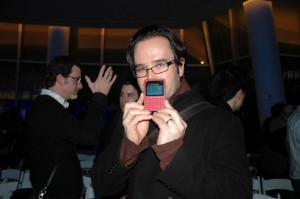
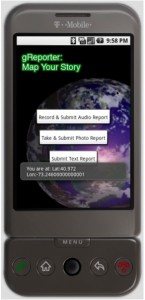
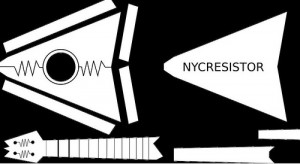
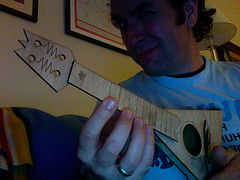
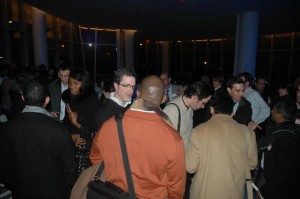

April 5th, 2009 at 11:36 pm
>except all these are open-source and built by lots of small developers and not one big corporation
How do you plan on paying for that?
BTW, if I see any spimes, I’m going to step on them!
April 16th, 2009 at 6:09 pm
Prokofy – well, there is definitely a model for paying for Intents. Just like you can sell “apps” in the iPhone store, you can actually sell Intents/Services/Libraries through the Android Market.
For instance, someone might release an application that uses the built-in camera library, but might tell the user “if you want better pictures, you should upgrade to the SnappyCam App 1.0!”, since this other camera app handles the shutterspeed and stability better. The user then goes and buys that app for $2.99 from the market, and the original app can now make use of it.
Rad, eh?
August 26th, 2009 at 7:42 am
David, I stumbled on this post via a google search, interesting perspectives.
viaPlace works different then you describe. We don’t store end users locations or anything about an end user by default. A user can optionally create an account to store their favorite locations or to leave comments about a points of interest.
Our registry system distributes data that has been tagged by location and type. The client devices have a preferences setting where you can filter that data by type (i.e. restaurant, transportation, events, etc.), as well as by location and distance. Its more like doing a SQL query and getting back everything that is pertinent to you, not the other way around. Hope that helps clarify.
Best,
Todd Marks
CEO | President
viaPlace, a product of
Mindgrub Technologies